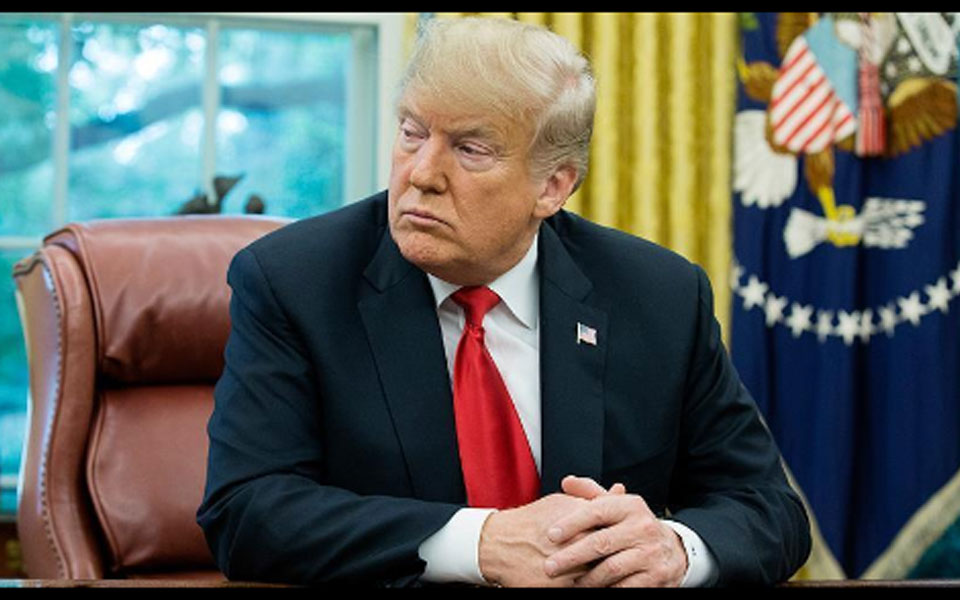Washington, Oct 11: More than 20 top US Senators have asked President Donald Trump to order an investigation into Saudi journalist Jamal Khashoggi's whereabouts and impose sanctions against anyone found responsible for his mysterious disappearance.
In a letter to Trump, the 22 lawmakers triggered the 2016 Global Magnitsky Act, which gives the President 120 days to decide whether to impose sanctions on any foreign person he determines sponsored or was involved in the disappearance of 59-year-old Khashoggi, an outspoken critic of the Saudi government and Crown Prince Mohammed bin Salman.
Khashoggi, a US resident, vanished on October 2 after entering the Saudi consulate in Istanbul. Turkish authorities suspect he was abducted and murdered by the Saudis.
But Riyadh insists that the journalist had left the building and that murder claims are "baseless".
Trump on Wednesday said he had taken up the case of the journalist and demanded all answers into his disappearance of from the Saudi authorities.
In the letter to Trump, the Senators said the disappearance of the 'Washington Post' columnist suggested that he could be a victim of a gross violation of internationally recognised human rights.
The violations includes "torture or cruel, inhuman, or degrading treatment or punishment, prolonged detention without charges and trial, causing the disappearance of persons by the abduction and clandestine detention of those persons, and other flagrant denial of the right to life, liberty, or the security of person".
"Therefore, we request that you make a determination on the imposition of sanctions pursuant to the Global Magnitsky Human Rights Accountability Act with respect to any foreign person responsible for such a violation related to Mr Khashoggi," the lawmakers said.
"Our expectation is that in making your determination you will consider any relevant information, including with respect to the highest-ranking officials in the Government of Saudi Arabia," the lawmakers said.
The letter was penned by the top Republican and Democrat on the Senate Foreign Relations Committee, chairman Senator Bob Corker and ranking member Senator Bob Menendez, along with the leaders of the appropriations subcommittee for the State Department, Senator Lindsey Graham and Democrat Senator Patrick Leahy.
Earlier in the day, Trump expressed deep disappointment over the situation.
"We are very disappointed to see what is going on. Don't like it. Don't like it at all. And are going to get to the bottom of it," Trump told reporters in response to a question.
"This is a bad situation. We cannot let this happen. To reporters and to anybody, we cannot let this happen. We are going to to the bottom (of it)," he said.
Trump said he and the First Lady Melania had received a letter from Khashoggi's fiancee Hatice Cengiz.
"We are in contact with her now. And we want to bring her to the White House. It's very sad situation. It's a very bad situation," he said.
White House National Security Advisor John Bolton and White House Senior Advisor Jared Kushner spoke to Saudi Arabian Crown Prince Mohammed Salman on Tuesday about the missing journalist.
Secretary of State Mike Pompeo then had a follow up call with the Crown Prince to reiterate the US' request for information
"In both calls they asked for more details and for the Saudi government to be transparent in the investigation process. We will continue to monitor this situation and provide updates as available," White House Press Secretary Sarah Sanders said.
Let the Truth be known. If you read VB and like VB, please be a VB Supporter and Help us deliver the Truth to one and all.
London (PTI): The UK on Wednesday imposed a study visa ban on four countries accused of using the route as a backdoor entry to seek permanent refuge in the country, as part of a wider clampdown on the soaring rates of asylum applications.
The so-called "emergency brake" on student visas applies to Afghanistan, Cameroon, Myanmar and Sudan, with Afghans also subject to a skilled worker visa ban following a major surge in asylum claims from these countries.
The move comes as UK Home Secretary Shabana Mahmood introduces new legislation in Parliament this week, with the visa brake to be introduced via an Immigration Rules change on Thursday to come into force on March 26.
"Britain will always provide refuge to people fleeing war and persecution, but our visa system must not be abused," said Mahmood.
“That is why I am taking the unprecedented decision to refuse visas for those nationals seeking to exploit our generosity. I will restore order and control to our borders,” she said.
According to official statistics released by the Home Office alongside the visa ban announcement, asylum applications by students from Afghanistan, Cameroon, Myanmar and Sudan rocketed by over 470 per cent between 2021 and 2025 – making them among the most likely nationalities to claim asylum.
Meanwhile, the number of Afghans on work visas claiming asylum now outstripping the number of visas issued.
In what has been described as an “unprecedented step”, the Home Office said it will end sponsored study visas from all four countries and skilled worker visas for Afghan nationals.
“Tough action is required as asylum claims from legal routes have more than trebled since 2021 – making up 39 per cent of the 100,000 people who applied last year. In total, 133,760 people have claimed asylum after arriving legally in the past five years,” the Home Office said.
It said these refugees end up having to be accommodated at the expense of the British taxpayer, with an “above average proportion” of people from the four countries claiming destitution.
“Asylum support is currently costing more than 4 billion pounds a year – with nearly 16,000 nationals from the four countries currently supported at public expense, including over 6,000 in hotels," it added.
According to official data, between 2021 and the year ending September 2025, the proportion of Afghan asylum claims to study visas issued was 95 per cent, applications by students from Myanmar soared 16-fold over the same period and claims by students from Cameroon and Sudan spiked by more than 330 per cent.
The government pointed to its success in reducing student asylum claims by 20 per cent over the course of 2025, but stressed that further action is needed as those arriving on study visas still make up 13 per cent of all claims in the system.
The visa ban announcement comes on the back of Mahmood's announcement earlier this week that asylum status in the UK will be temporary, to be reviewed after 30 months.





